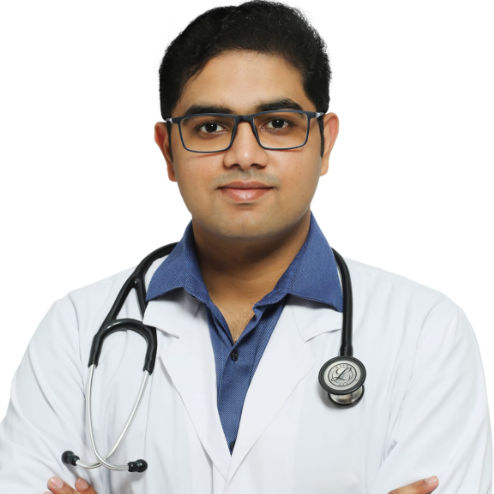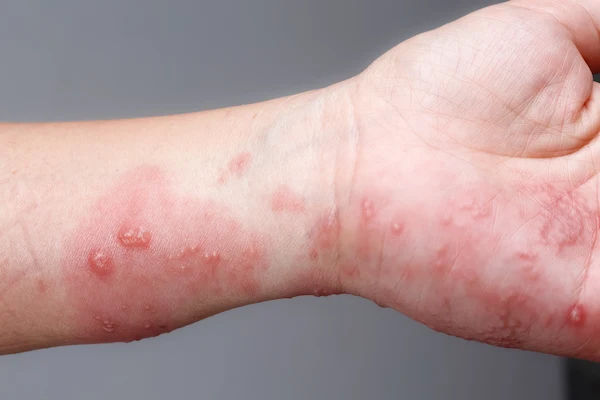Understanding Shingles: Symptoms, Causes, and Treatment
Learn about shingles, a viral infection caused by the varicella-zoster virus. Understand its symptoms, causes, risk factors, treatment options, and how to prevent future outbreaks.

Written by Dr. Rohinipriyanka Pondugula
Reviewed by Dr. Md Yusuf Shareef MBBS
Last updated on 22nd Aug, 2025

Shingles is a painful skin rash caused by the same virus that causes chickenpox—the varicella-zoster virus (VZV). If you’ve had chickenpox before, the virus stays dormant in your nerves and can reactivate later in life as shingles. While it’s not life-threatening, shingles can be very uncomfortable and, in some cases, lead to complications.
This article will help you understand shingles, its symptoms, causes, and treatment options, along with tips to manage the condition effectively.
What Are the Symptoms of Shingles?
Shingles usually affects one side of the body, often appearing as a band-like rash on the chest, back, or face. The common symptoms include:
1. Pain, Burning, or Tingling: Before the rash appears, you may feel pain, itching, or a burning sensation in the affected area.
2. Red Rash: A few days after the pain starts, a red, blister-filled rash develops.
3. Flu-Like Symptoms: Some people experience fever, headache, fatigue, or sensitivity to light.
4. Blisters That Scab Over: The blisters eventually burst and form crusty scabs, which heal in 2–4 weeks.
In rare cases, shingles can affect the eyes (ocular shingles) or ears (Ramsay Hunt syndrome), leading to vision or hearing problems.
Get Your Symptoms Checked By Top Specialists
What Causes Shingles?
Shingles occurs when the varicella-zoster virus, which remains inactive in your body after chickenpox, gets reactivated. The exact reason for reactivation is unclear, but the following factors increase the risk:
Weakened Immune System: Due to ageing, stress, or illnesses like HIV, cancer, or diabetes.
Age: People over 50 are at higher risk because immunity weakens with age.
Certain Medications: Drugs that suppress the immune system (like steroids or chemotherapy).
Previous Chickenpox Infection: Only those who’ve had chickenpox can develop shingles.
Note: Shingles is not contagious, but the virus can spread to someone who hasn’t had chickenpox, causing chickenpox (not shingles) in them.
How Does Shingles Affect Health?
Most people recover fully, but some may experience complications, such as:
1. Postherpetic Neuralgia (PHN): Persistent nerve pain that lasts for months or even years after the rash heals.
2. Vision Problems: If shingles affects the eye (herpes zoster ophthalmicus), it can lead to blindness if untreated.
3. Skin Infections: Scratching the blisters can cause bacterial infections.
4. Neurological Issues: Rarely, shingles can cause brain inflammation (encephalitis) or facial paralysis.
How Is Shingles Treated?
Early treatment can reduce pain and speed up recovery. Doctors may recommend:
1. Antiviral Medications: Drugs like acyclovir, valacyclovir, or famciclovir help shorten the illness and prevent complications.
2. Pain Relievers: Over-the-counter painkillers (ibuprofen, acetaminophen) or prescription medications for severe pain.
3. Topical Creams: Calamine lotion or lidocaine patches can soothe itching and pain.
4. Home Care: Keeping the rash clean, avoiding scratching, and using cool compresses can help.
If you suspect shingles, consult a doctor immediately, especially if the rash is near the eyes or ears.
Tips to Prevent and Manage Shingles
Here are some tips to prevent and manage shingles:
1. Get Vaccinated
The shingles vaccine (Shingrix) is highly effective in preventing shingles and PHN. It’s recommended for adults over 50.
If you’ve had shingles before, vaccination can still help prevent future outbreaks.
2. Boost Your Immune System
Eat a balanced diet rich in vitamins (especially B12, C, and D).
Exercise regularly and manage stress through yoga or meditation.
Get enough sleep to support immune function.
3. Avoid Spreading the Virus
Keep the rash covered until it scabs over.
Avoid contact with pregnant women, newborns, and people with weak immunity.
4. Seek Early Treatment
If you experience early symptoms (tingling, burning), see a doctor right away—starting antivirals within 72 hours can make a big difference.
When to See a Doctor?
Consult a doctor immediately if:
The rash is near your eyes or ears.
You have a weakened immune system.
The pain is severe or lasts beyond the rash healing.
You develop a high fever or signs of infection (pus, swelling).
If you need expert advice, Apollo 24|7 offers convenient online consultations with dermatologists and specialists. You can also book lab tests to confirm the diagnosis.
Conclusion
Shingles can be painful and disruptive, but early treatment and preventive measures can help manage it effectively. If you’re over 50 or at risk, consider getting vaccinated. Maintaining a healthy lifestyle and seeking medical help at the first sign of symptoms can make recovery smoother.
If you suspect shingles or need guidance, don’t hesitate to reach out to a healthcare provider.
Consult Top Specialists
Get Your Symptoms Checked By Top Specialists

Dr. Mohammed Kamran
General Practitioner
5 Years • MBBS, FIDM
Nashik
Apollo 24|7 Clinic - Maharashtra, Nashik

Dr. Hariprasath J
General Physician/ Internal Medicine Specialist
19 Years • MD (Gen Med), FCCP, Dip (Diabetology, UK)
Chennai
Apollo First Med Hospitals P H Road, Chennai
(200+ Patients)

Dr. Ashita Kuruvilla
General Practitioner
6 Years • MBBS
Kolkata
KVC CLINIC, Kolkata

Dr. Arindam Bauri
General Physician/ Internal Medicine Specialist
12 Years • MBBS, MD General Medicine
Kolkata
LifeCare, Kolkata
(25+ Patients)

Dr Vvn Goutham
General Physician/ Internal Medicine Specialist
10 Years • MBBS, MD General Medicine
VIZAG
VITALS SPECIALITY HEALTH CLINICS, VIZAG
Consult Top Specialists

Dr. Mohammed Kamran
General Practitioner
5 Years • MBBS, FIDM
Nashik
Apollo 24|7 Clinic - Maharashtra, Nashik

Dr. Hariprasath J
General Physician/ Internal Medicine Specialist
19 Years • MD (Gen Med), FCCP, Dip (Diabetology, UK)
Chennai
Apollo First Med Hospitals P H Road, Chennai
(200+ Patients)

Dr. Ashita Kuruvilla
General Practitioner
6 Years • MBBS
Kolkata
KVC CLINIC, Kolkata

Dr. Arindam Bauri
General Physician/ Internal Medicine Specialist
12 Years • MBBS, MD General Medicine
Kolkata
LifeCare, Kolkata
(25+ Patients)

Dr Vvn Goutham
General Physician/ Internal Medicine Specialist
10 Years • MBBS, MD General Medicine
VIZAG
VITALS SPECIALITY HEALTH CLINICS, VIZAG
